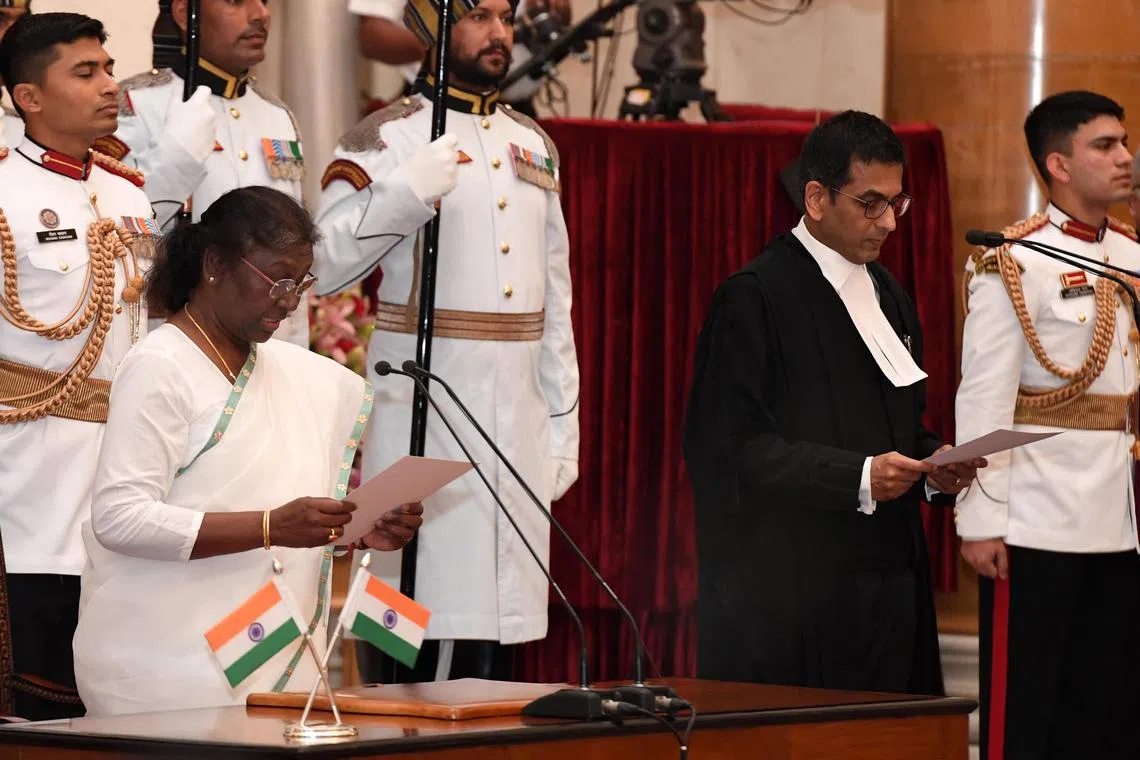Indians hope for stronger citizen rights under new chief justice
Sign up now: Get insights on Asia's fast-moving developments

Chief Justice Dhananjaya Yashwant Chandrachud (in black robes) at the swearing-in ceremony on Nov 9, 2022.
PHOTO: PRESIDENT OF INDIA/TWITTER
Follow topic:
Bengaluru – The judiciary of the world’s biggest democracy will now be led by one of its most liberal members, following the swearing in of Justice Dhananjaya Yashwant Chandrachud as the 50th Chief Justice of India on Nov 9.
The eight-year Supreme Court justice’s appointment by seniority has generated a buzz in India, where Chief Justices have in recent years been seen to condone excesses by the executive in the country.
Known to be scholarly and tech-savvy, Chief Justice Chandrachud, 63, has a reputation for championing human rights and marginalised communities.
Activists and legal experts expect the judge to challenge any unconstitutional policies by the Parliament and executive during his two-year tenure.
While soft-spoken, the judge has on many occasions been in the minority on Supreme Court benches as he stood up for individual rights in verdicts that otherwise bolstered state power.
For instance, his was the only dissenting opinion from the five-judge bench in a public interest petition on the constitutionality of the national unique identification number, Aadhaar. He stated that the passing of the Aadhaar Act as a money bill in Parliament was “subterfuge” and unconstitutional.
He is best known for his path-breaking, poignant words in a 2017 nine-judge bench judgment affirming the right to privacy. The verdict created the grounds for the decriminalisation of homosexuality in 2018 after 157 years and set guardrails for framing digital privacy in a country that still has no data protection laws.
His description of dissent as “the safety valve of democracy” in a 2020 public lecture in Gujarat is often cited by activists, journalists and liberal Indians.
He also condemned the “labelling of dissent as anti-national or anti-democratic”, as Prime Minister Narendra Modi’s government has done to crack down on citizen protests and jail human rights defenders and reporters.
In a 2018 judgment, he stood up for five activists arrested under stringent anti-terrorism laws by questioning the impartiality of the investigating agencies.
“Justice Chandrachud’s track record is that he has always been sensitive to the plight of the vulnerable and champions individual liberties,” said senior Supreme Court lawyer Dushyant Dave.
In a case about women’s right to enter the Sabarimala temple in the southern state of Kerala, the judge had held that “the exclusion of women between the ages of 10 and 50 years… violated constitutional morality”.
Senior lawyer Gopal Shankaranarayanan lauded the Chief Justice’s “deeply rooted sense of justice and the judicial institution”, adding that he has often insisted that courts should be more approachable to citizens, and that the judiciary should better embrace technology.
Chief Justice Chandrachud’s tenure will last till he retires in November 2024 – months after crucial national elections expected that year. He will oversee politically sensitive cases that could have a bearing on the avowedly Hindu nationalist Modi government’s campaign to get a third term.
All eyes are on how he will handle hot-button cases about a religiously discriminatory citizenship law, Kashmir’s autonomy, and transparency of political funding.
Legal observers noted that the judge had been non-committal in cases important to the Modi government so far, such as the building of the Lord Ram temple at the site of a 16th-century mosque that a Hindu mob demolished in 1992.
“The executive has grown extraordinarily powerful and is getting away with a lot today, violating basic human rights without any judicial checks. We are witnessing a serious erosion of judicial authority,” Mr Dave said.
The senior lawyer hopes that Chief Justice Chandrachud would “be as strong on attempts to erode public values and constitutional rights, as he always is when defending private rights of citizens”.
Chief Justice Chandrachud will have to tackle overwhelming administrative challenges in a judiciary that serves 1.3 billion people. This includes a backlog of 45 million pending cases at the Indian courts, and filling vacancies in the Supreme Court and High Courts that stand at 20 per cent and 40 per cent respectively.
The son of the longest-serving Chief Justice of India, Justice Chandrachud grew up in Mumbai, studied law in Delhi University, and has a doctorate in juridical science from Harvard University.
He was a practising lawyer in the Bombay High Court before becoming a solicitor general of the government at the Supreme Court in 1998. He has been a judge since the year 2000.
He has two sons, both lawyers, with his first wife, who died of cancer in 2007. He now fosters two daughters with special needs with his wife Kalpana Das, also a lawyer.


